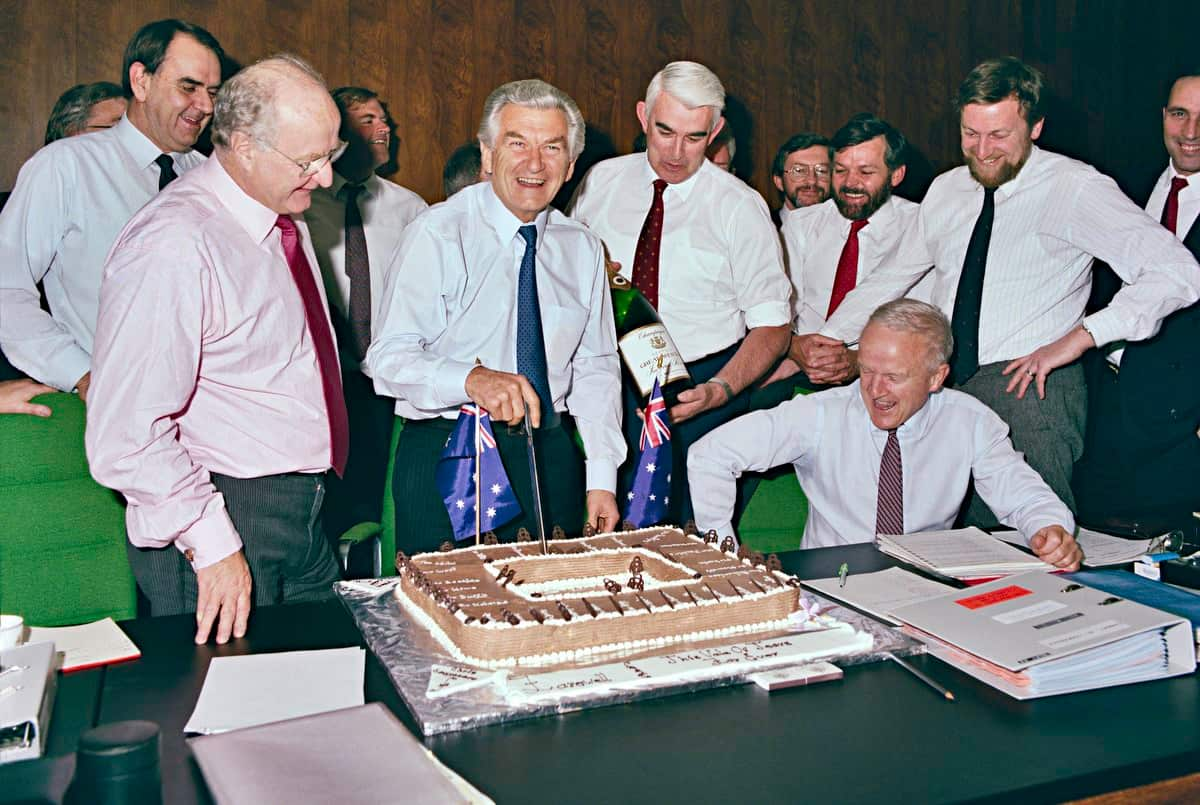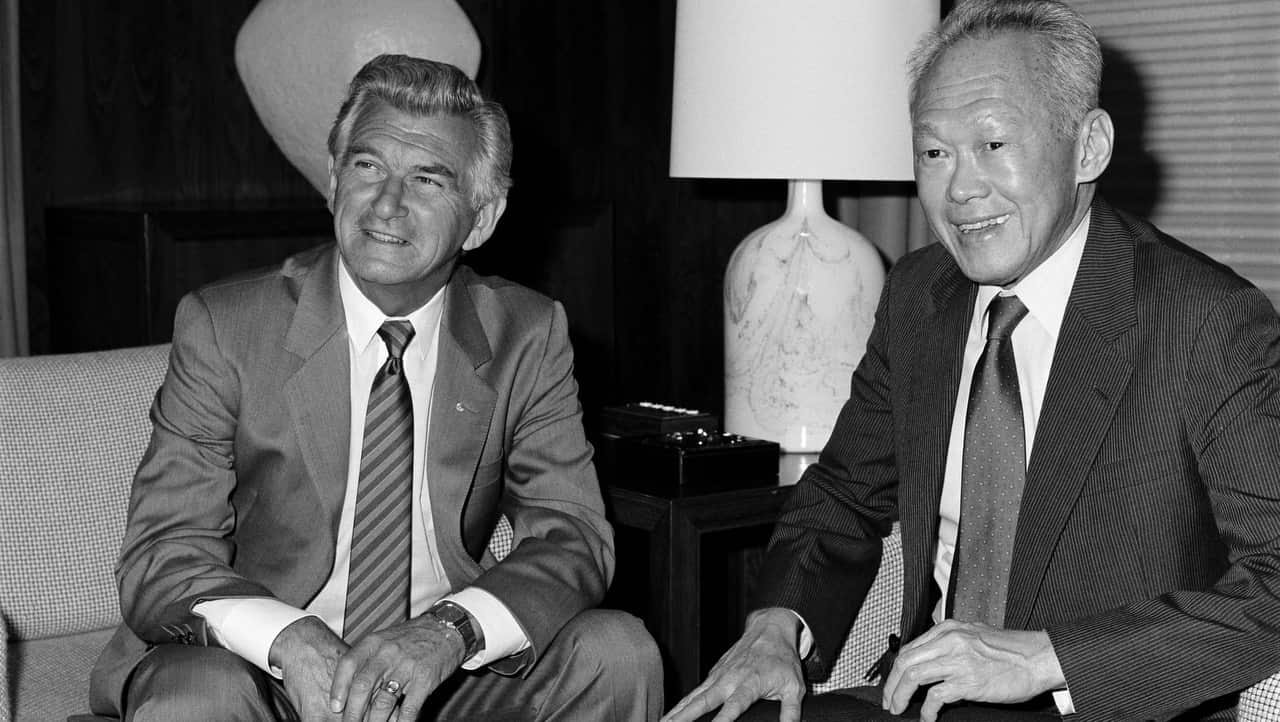Bob Hawke served as Australia’s prime minister from 1983 through to 1991. His passing on Friday, at 89, has seen tributes flow in.
The beer-sculling, sports-loving Rhodes Scholar achieved the highest popularity rating of any prime minister since the introduction of public opinion polls, with approval ratings hitting 75 per cent in 1984.
That’s not been beaten since.
Associate professor of Australian politics Haydon Manning at Flinders University said that kind of political longevity from 1983 to 1991 is remarkable in politics.
"He established himself with a command of his party, but he particularly pushed the left-wing of his party behind himself and Paul Keating," he told SBS News.

Bob Hawke, John Kerin, John Dawkins, Gareth Evans, other ministers and staff at the last Cabinet meeting in the old Cabinet Room, 1988. Source: National Archives of Australia/AAP
"And the net result was a period of electoral victory that allowed Hawke, alongside Keating, arguably the most reformist government we've seen since Federation in 1901.
"So that is how I see his significance. It is not just pointing to all the significant reforms. It is noting that they were able to achieve them because they kept winning elections."
A Liberal head?
During his time in office, Mr Hawke passed a number of economic reforms aimed at deregulating the economy, including floating the Australian dollar and privatising government enterprises, including the Commonwealth Bank.
Both sides of politics were quick with the praise on Friday, including former Liberal prime minister Tony Abbott who caused controversy after

Former prime minister Bob Hawke in 2016. Source: AAP
Professor Macintyre said he did not agree with that assessment.
"I see the point Tony Abbott is making in terms of the transformative nature of the economic relationships. But Hawke did it in a way that was entirely consistent with the expectations that you would have of a Labor prime minister," he said.
"He was pursuing what he saw as (being of) benefit for the whole of the economy and for the whole of the working population of Australia. And I don't think anyone would seriously categorise that as Liberal policies in disguise."

Former prime ministers Paul Keating and Bob Hawke at the Labor campaign launch in 2016. Source: AAP
Pivot to Asia
On the international policy front, Mr Hawke had a vision of an Australia as a middle power with links to Asia and the United States.
One of his achievements included setting up Asia Pacific Economic Cooperation in 1989 to promote economic participation and growth in the region.
Driving his urgency was a warning by Singapore's Prime Minister Lee Kuan Yew that Australia risked being the without economic and social reform.
Professor Manning said Mr Hawke had an acute awareness of the need to expand Australia's regional links.
"He had an appreciation that Australia needed to open up to the world. So you needed to de-regulate the financial system, invite in foreign banks. You needed to gradually work to pull in our tariff barriers. You needed to weld Australia more to our near Asian markets," he said.
"And that required a shift really in the view of Australia having historically looked to Britain, Europe and America. Needing to balance that vision, we needed to hold onto that vision, particularly with America. But we needed to balance that more with an appreciation of Asia. His government really began that more than any previous government and of course, it continues today."

Bob Hawke meeting with Singapore Prime Minister Lee Kwan Yu in 1986. Source: National Archives of Australia/AAP
Re-introduced universal health care
On the social policy agenda, Mr Hawke re-introduced universal health care through the Medicare system.
Professor Manning said the Labor PM was in touch with the needs of Australians.
"It's part of his deeper background and his childhood. He came from a very religious family. His father was a preacher, and he was very caring as a consequence for poorer people. But his experience as a trade union leader throughout the sixties and seventies, I would really argue is what made Hawke a leader who understood how people needed to be given opportunity," he said.
"And if health was bad, you couldn't afford to fix your health. Whitlam had set up Medibank, when Whitlam fell, Medibank fell. Hawke wanted to set up Medicare, similar to Medibank - national free health insurance scheme and embed it in and make sure it couldn't be unpicked. And that really is the point. He kept winning enough elections that by the time Labor lost office. Australia's loved Medicare. There was no choice that the Liberals could remove it."
Anti-apartheid work Hawke's proudest achievement
Mr Hawke himself nominated his work aimed at ending apartheid in South Africa as one of his proudest achievements as prime minister.
Over 21 years, he campaigned for the end of institutionalised racial segregation in South Africa. He took up the campaign as ACTU President in 1969 and continued his advocacy as prime minister, standing by a ban on South African sporting tours.

Nelson Mandela was only recently freed from prison when he met Bob Hawke on October 1990. Source: AAP
His efforts were acknowledged by Nelson Mandela who personally conveyed his thanks during a visit to Australia in 1990.
Dr Ian Cook, a lecturer in Australian politics at Murdoch University, said that achievement allowed him to combine two of his passions: sports and politics.
"Part of our move against the apartheid was to ban sporting teams. That sort of Bob Hawke: politics and sports - that was the sort of mix he was involved in. He had this sense of social justice and his concern for the battlers," he said.

Former Australia II skipper John Bertrand, Australia II owner Alan Bond and Bob Hawke during the 30th anniversary of Australia's win at America's Cup in Sydney. Source: AAP
"He was someone who was willing to be emotional and to show concern and feeling. And he would have felt strongly with respect with the problems in South Africa. So I understand why he would see that as an achievement - because it would be so emotionally satisfying."

